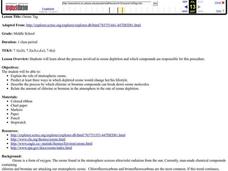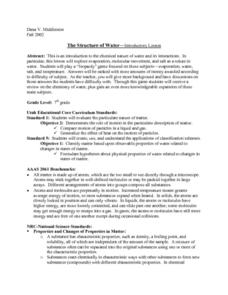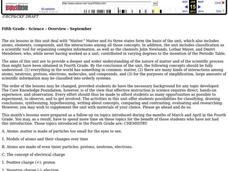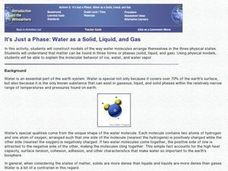American Chemical Society
What is a Chemical Reaction?
When a candle burns down, what happens to the mass that appears to be shrinking? Lesson begins with a demonstration of the chemical reaction of a candle burning. Then scholars use atom models to observe conservation of mass...
Global Change
The Carbon Cycle and its Role in Climate Change
So how does the carbon cycle work? Kids participate in a hands-on activity that allows them to understand the chemistry behind climate change and global warming. They act out the process of photosynthesis by labeling themselves as...
Cornell University
Splitting Water with Electricity
Explore how electricity splits water molecules into hydrogen and oxygen. Learners begin by calculating the voltage necessary to separate the water. They then perform the experiment and measure the ratio of hydrogen and oxygen bubbles.
Teach Engineering
Active and Passive Transport: Red Rover Send Particles Over
I can move about freely, but you cannot. The class models the movement through cell membranes by way of passive and active transport. Members of the class play the roles of various proteins, atoms, compounds, and cell actions and mimic...
Center Science Education
The Nitrogen Cycle Game
Earth science experts learn about the roles of nitrogen by taking a virtual journey through the nitrogen cycle. Completing a passport worksheet along the way, they move from place to place around the classroom by the toss of dice. Each...
Curated OER
Matter And Its Changes
Fifth graders explore the phases of matter, make observations of matter, the physical and chemical properties of matter, solutions and mixtures, formation of molecules and atoms and molecules all through hands on activities.
Curated OER
Molecular Modeling Activity
Students explore the concept of molecular modeling and differentiate between saturated and unsaturated compounds. In small groups, they identify molecular formulas, complete a chart comparing alkanes, alkenes, and alkynes, and construct...
American Chemical Society
Heat, Temperature, and Conduction
How does heat move from one item to another, even when the items are in different states of matter? Pupils experiment with adding washers to hot water and adding hot washers to room temperature water to observe the heat transfer.
American Chemical Society
Forming a Precipitate
Can you mix two liquids to make a solid that is insoluble? Yes, you can, and pupils see this as the lesson uses more than one combination of liquids to form a solid. Through two teacher demonstrations and a hands-on activity,...
American Chemical Society
Why Does Water Dissolve Sugar?
Did you know that if you wait long enough, the M on the outside of an M and M will float to the surface when submerged in water? Learners observe the sugar coating of an M and M while it is dissolving in water. They explain how this...
University of Georgia
Endothermic and Exothermic Reactions
Equip your chemistry class with the tools to properly understand endothermic and exothermic reactions. Young chemists collect, analyze, and graph data to determine how the Law of Conservation of Matter is applied to chemical...
Curated OER
Ozone Tag
Seventh graders explain the role of stratospheric ozone and predict at least three ways in which depleted ozone would change her/his lifestyle. They then describe the process by which chlorine or bromine compounds can break down ozone...
Curated OER
Doing Lewis Dot Diagrams
Students observe the periodic table and draw the Lewis Dot Diagram. In this investigative instructional activity students construct information on several elements including the Lewis Dot Formation and take a quiz on the...
Curated OER
The Chemical Nature of Water
Seventh graders simulate a Jeopardy game to examine the chemical nature of water. Among the topics featured are evaporation, water, salt, and temperature. finally, as review, 7th graders answer a battery of questions presented by the...
Curated OER
Ancient Atomic Theories
Studdnts research ancient texts and compare ancient Greek atomic theories, as used in the production of silver, to modern theories.
Curated OER
Matter
Fifth graders investigate the nature of matter and of the scientific processes associated with them in this series of lessons.
Curated OER
Structure-Property Relationships
Students explore the structure and property changes of water through videos and classroom discussion. They are introduced to atomic arrangement of solids by looking closely at carbon in different forms, such as graphite and diamond....
Curated OER
Catering Middle-School Science: Monomers, Polymers, and Macromolecules
Students investigate foods. For this biology lesson plan, students will conduct testing on different types of foods as they learn about different molecules that make them up. Students will also learn about the shapes of the molecules.
Curated OER
The Causes of Differences in Density
Students explore how density changes. Students read an article on density. They observe a ball and ring demonstration and discuss the outcome. Students draw models of the demonstration and explain what happened.
SRI International
Science of Water
Water is crucial to survival. Scholars gain an appreciation for water by reading about it, learning about its atomic properties, and investigating its properties through six stations in a lab activity.
Cornell University
Polymers: Instant Snow
Is it easy to make snow? Scholars use critical thinking skills as they investigate the concept of polymers by making snow. The class tests several different variables and takes measurements over the course of several days. They then...
Curated OER
Activity #3 Are Particles "Real?"
Students verbalize a simple particle theory, They apply their particle theory to explain what happens during chemical reactions and how this theory supports the law of conservation of matter. Pupils comprehend that the atomic theory,...
Curated OER
It's Just a Phase: Water as Solid, Liquid and Gas
Students construct models of the way water molecules arrange themselves in three physical states - solid, liquid, and gas. They explain the molecular behavior of ice, water, and water vapor.
Curated OER
Winter
Students explore the nature of water and water molecules. They examine the role of ice on organisms.
Other popular searches
- Gumdrop Atoms and Molecules
- Counting Atoms Molecules
- Making Atoms and Molecules
- Atoms & Molecules Ppt
- Matter Atoms Molecules
- Science, Atoms and Molecules
- Science Atoms and Molecules
- Atoms Molecules Elements
- Atoms & Molecules Pot
- Atoms and Molecules Lesson
- Atoms Molecules Units
- Atoms and Molecules Musical























